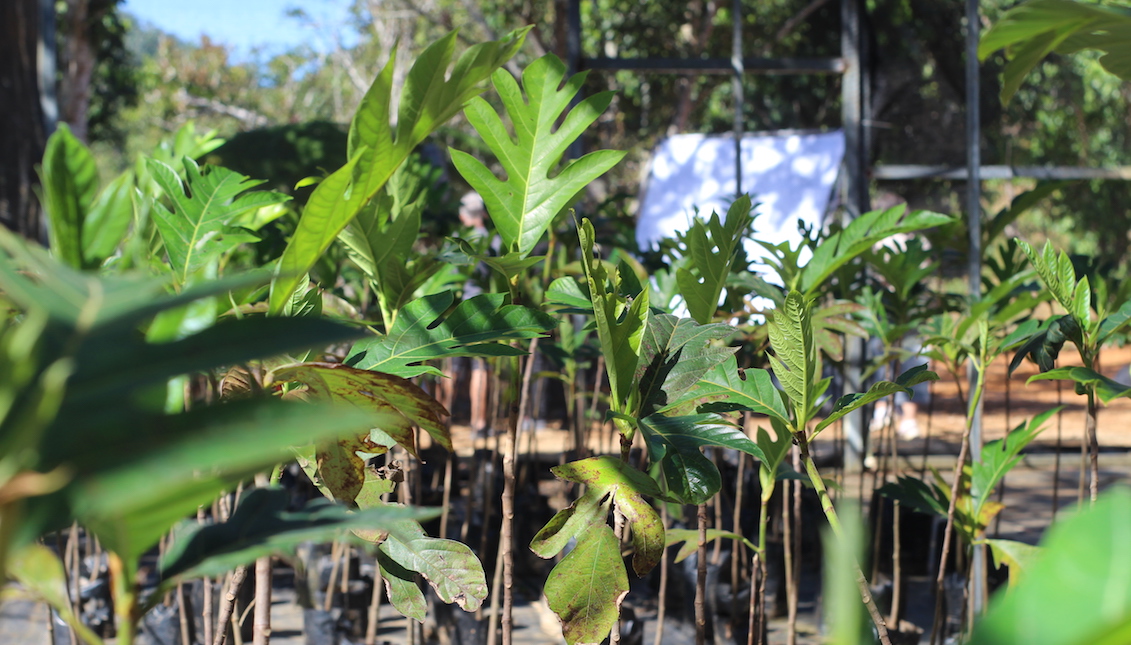
Harvest revival in Puerto Rico after María
The development of agriculture in Puerto Rico has been one of the biggest challenges in the country for decades. Today, it is an opportunity for the Island's…
Rubén Rosas and Luis Cuadrado grow garden produce while also manufacturing hot and spicy sauces and condiments with ingredients from their farm. Marisol Lugo and her family manufacture a line of pancake mixes made from the dehydrated breadfruit (“panapén”) they grow. Besides being able to make a living from agriculture in Puerto Rico, what do these entrepreneurs have in common? Three years ago, none of them would have even thought of working the land or profiting from it.

Ruben is a community social worker while his business partner, Luis Cuadrado, studied communications. They’re both in their early thirties and neither of them comes from a farming background. Nevertheless, in 2015 they decided to take on an agricultural project they named “A la cosecha” (To the harvest) in their town of Yabucoa in southeastern Puerto Rico.
They started growing “recao” (pepper), “ají dulce” (sweet pepper) and eggplant, among other products. But their business plan went beyond the crops and the by-products they learned to manufacture with their natural ingredients. These young men also developed an educational project which promotes student visits to their farm. These visits have become great opportunities to offer both tutoring and technical assessment to promote the development of vegetable gardens in schools and communities.
What they couldn’t have expected was the arrival of Hurricane María in September of 2017. They not only lost all their crops but also had no power for 10 months. A $6,000 donation from World Central Kitchen, renowned Spanish chef José Andrés’ non-profit foundation, allowed them to start again from scratch.
“There’s been a sort of awakening,” explains Rubén. “You have the older ones who decided to quit after María, but there’s also a new stock of farmers with a clearer conscience of the need to resume these processes from a more social and ecological perspective.”

Agricultural development has been one of Puerto Rico’s biggest challenges for decades. In 1940, for example, agriculture represented 33.7% of the island’s gross income. By 2002, the industry’s contribution was down to .1%, generating only approximately 14,000 jobs. Hurricanes Irma and María in 2017 left the industry with losses in the range of $2.2.
The most recent census results, conducted by the U.S. Department of Agriculture in January of this year, won’t be available until February of 2020. But Puerto Rico doesn’t need to wait for these results to know what that the winds of change have arrived. You can see the transformation. While on one hand, María pushed many older farmers into retirement, on the other, it also became a wake-up call for a lot of young people.
RELATED CONTENT
Héctor Betancourt, president of the town of Trujillo Alto’s farmers' association agrees that the conscience developed after María has injected Puerto Rican agriculture with younger blood.
“They’re bringing new technology, like hydroponics for smaller spaces, for example. This new generation has realized that agriculture in Puerto Rico has become profitable.”
This newfound sustainability is the result of the many agricultural family farmers markets and fairs organized all over the island. Local grocery store chains and some multinationals, like Walmart, for example, have also become more supportive of the local farmers, not only by buying their products but also by pushing them to higher quality standards.

Chef José Andrés, who led a team that served more than three million plates of food after María, is convinced that Puerto Rico has a great future in agriculture.
“It doesn’t make sense for the island to be consuming salad from California when it can be grown here. Puerto Rico imports 90% of its food but my dream is that in four years we can bring it down to 75%”
The president of the Farmer’s Association of Puerto Rico, Héctor Iván Cordero, explained that although the agriculture renaissance is real, there’s still a lot to work ahead. One of the fastest-growing sub-industries has been coffee, which makes up two-thirds of the association’s registration. Cordero admits that although the interest in agriculture has grown, other elements need to be strengthened in order to allow for the further expansion of the industry.
“Food security depends on the ability of a country has to store and transform products in order to make them available during an emergency,” he explains. “Processing, packaging, and canning plants have all disappeared in Puerto Rico and that becomes a great limitation for farmers.”










LEAVE A COMMENT:
Join the discussion! Leave a comment.